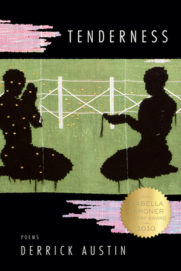 Derrick Austin
Derrick Austin
BOA Editions ($17)
by John Bradley
Tenderness isn’t a quality often used to describe contemporary poetry, but it’s certainly an appropriate title for this book, Derrick Austin’s second. In “Taking My Father and Brother to the Frick,” for example, the narrator notes how museumgoers regard the paintings, and then poses this question about his Black father and brother: “Who has looked at either of you lately / with such tenderness?”
Austin knows how to transform vulnerability into tenderness, yet never ignores the history that surrounds him, as demonstrated in these lines from “Epithalamium” (the first of two poems with this title in the book):
In this lush expanse a man
was lynched
at the beginning of the century
I was born in.
The speaker was born not just into a century, but into a web of violence targeting those like himself, a gay, Black man. When he writes about visiting Mexico in “Obsidian Mirror,” what surprises him is his acceptance there: “We were black men in a city / an oasis, where we need not / flinch at another’s approach.” The word “flinch” says so much.
If there’s one poet who seems to have been a major influence on Austin’s style, it’s Frank O’Hara. This can be seen in the names of the author’s friends who populate these autobiographical poems: “Morgan and Danez rowed in the Grand Canal at Versailles” and “Drinking rosé at Gib’s, I thought of you typing / in your dream house near Canada” and “Vanessa and Rubi point their kids toward water birds breaking funny poses to fly.” Austin’s phrase “casual intimacy” in his poem “’And Also with You’” best describes this style, but this intimacy extends to the reader as well, often with a direct, soul-baring statement, as in the closing of “Black Docent”:
Whistler painted The Peacock Room
140 years ago. Slavery had not been excised
from the Americas. I’ve wanted
to be hurt into gold.
In viewing Whistler’s The Peacock Room, the artist’s lush use of gold brings the closing all the more clarity and bite.
While the vast majority of the poems are personal, Austin shows he’s able to explore historical figures with the same delicacy and insight that he brings to the present. In “The Devil’s Book,” Austin writes about Tituba, an enslaved girl in Salem, Massachusetts, who was the first accused by the Puritans of witchcraft. The poem states: “Tituba was no witch. She simply saw the nooses / each citizen held,” a line chilling in the way it resonates with our current society’s constant violence toward people of color. Austin’s direct statement feels like an x-ray.
The other historical poem in the book is a persona poem in the voice of George Villiers, who “was a favorite of King James I of England and likely his lover.” In a series of couplets, we hear Villier’s testimony: “I ignored my wedding vows and you the state. / What’s more erotic than the dream of control?” Even in an erotic love poem, however, Austin reminds us of aforementioned injustice: “During your reign, witches burned.” Love cannot remove all fear and cruelty from the heart, the poem reminds us.
It’s easy to see why Tenderness won the Isabella Gardner Poetry Award. Over and over, Austin demonstrates his skill with these sensitive, lyrical poems. It will be fascinating to see if Austin will move further beyond the autobiographical in future and continue exploring historical fault lines.
